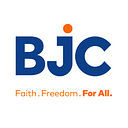America’s public schools protect religious liberty. We all should be #PublicSchoolProud
By BJC Executive Director Amanda Tyler

For decades, BJC has worked with religious and secular organizations to ensure that people of all faiths, as well as those who practice no faith, have their First Amendment rights protected.
One of our coalition efforts involves protecting public education. We are a proud member of the National Coalition for Public Education, and each year we participate in Public Schools Week, a national celebration of the importance of public schools and the hard-working educators who teach our nation’s kids.
One might ask: what does support for public education have to do with religious liberty? The answer to that question is simple: BJC supports public schools because public schools support religious liberty for all students.
As I noted in a recent piece for Religion News Service, “For decades, public schools across the nation have modeled how religiously diverse populations can build relationships of trust and care.” In public schools, students are protected by our nation’s constitutional guarantee of faith freedom for all. They can pray, wear religious clothing and accessories, and talk about their beliefs. School officials cannot lead students in prayer or engage in other government-sponsored religious exercises, which would violate our First Amendment principles and harm faith freedom for all. BJC has a printable handout with more details on how religious liberty rights are protected in public schools.
Furthermore, recent research indicates that religious tolerance is a treasured value in public schools. According to the Pew Research Center, 86 percent of U.S. teenagers enrolled in public schools indicate that they have rarely or never seen students in their school be teased or made fun of because of their religion. Public schools are excellent training grounds for living in our religiously diverse country. We should be investing in these communities and protecting every student’s religious freedom rights.
Unfortunately, we still encounter false statements that religious students are routinely persecuted in public school classrooms and the theologically ludicrous claim that God has been “kicked out of the public school.” As my predecessor James Dunn would say, “As long as there are math tests, there will be prayer in schools.”
Advocates for religious liberty should make no mistake: those who attack public schools as bastions of religious intolerance don’t make these claims to protect student’s religious beliefs. Sometimes, these claims are grounded in Christian nationalism, an ideology at odds with our country’s religious freedom commitment that conflates being a good citizen with being a good Christian.
Those inspired by Christian nationalism would replace our constitutional guarantee of religious liberty, a guarantee lived every day in public school classrooms, with a system that privileges Christianity over other religious and nonreligious traditions. Christian nationalism runs counter to both Christianity and the U.S. Constitution, which is why thousands of Christians have decried it as a danger to faith and freedom.
Unfortunately, in his recent State of the Union address, President Donald Trump appeared to stoke unfounded fear, claiming that his administration would push back against a movement attempting to “punish prayer” in the public square by “defending … the constitutional right to pray in public schools.” The only issue with this claim? No such movement exists. Voluntary, student-led prayer is welcome in every public school across the United States.
Ironically, in the same speech, the president promoted legislation that, if passed, would actually pose a serious threat to religious liberty and public schools: the Education Freedom Scholarships and Opportunity Act.
What is this legislation, and how does it threaten religious liberty? Let’s use a fictional citizen, Laura, as an example. In the United States, we invest in the common good of public education through local, state and federal taxes. If Laura elects legislators that decide that $5 of her taxes should be allocated for public education, that tax money goes to the public schools.
However, the legislation that President Trump championed in his State of the Union address provides $5 billion annually in tax credits for individuals and companies who give to scholarship funds that benefit private schools. These credits are dollar-for-dollar, meaning the government essentially reimburses the donor for her “gift” to a fund that benefits private schools. Under this legislation, Laura’s $5 in taxes get diverted from her local public school to reimburse her neighbor’s support for private schools.
Policies that incentivize taxpayer funding of private schools are a threat to public education and religious liberty. According to the Department of Education’s most recent statistics, nearly 7 in 10 private schools in the United States are religiously affiliated. The president’s plan would inevitably result in taxpayers like Laura paying for religious instruction — whether or not she agrees with it.
Furthermore, this funding scheme makes religious education dependent on government dollars, threatening the constitutional independence of religious organizations. In seven states, faith leaders in the Pastors for Children network have stood resolutely against government-funded private schools as a violation of church-state separation and the rights of taxpayers to insist the government remain neutral in matters of religion. As the National Coalition for Public Education points out, “many religious denominations” also reject cuts to public school funding because they “believe that access to a high-quality education is a fundamental right and an issue of social justice.”
Public schools serve the vast majority of students in the United States and do so with respect for religious liberty. They deserve our support. Join BJC and our partners in being #PublicSchoolProud, celebrating and supporting America’s public schools for what they are: a cornerstone of religious liberty.
